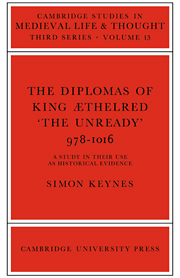Book contents
- Frontmatter
- Contents
- Figures
- Preface
- Note on system of reference
- 1 THE PRESERVATION AND CRITICISM OF ANGLO-SAXON ROYAL DIPLOMAS
- 2 THE PRODUCTION OF ANGLO-SAXON ROYAL DIPLOMAS BEFORE THE REIGN OF KING ÆTHELRED
- 3 THE DIPLOMAS OF KING ÆTHELRED
- 4 A FRAMEWORK FOR THE REIGN OF KING ÆTHELRED
- APPENDIX 1 The diplomas of King Æthelred: dating and witness lists
- APPENDIX 2 Meeting places of the king's councillors during the tenth and eleventh centuries
- Abbreviations and bibliography of works cited
- Index to citations of the diplomas of King Æthelred
- General index
1 - THE PRESERVATION AND CRITICISM OF ANGLO-SAXON ROYAL DIPLOMAS
Published online by Cambridge University Press: 19 October 2009
- Frontmatter
- Contents
- Figures
- Preface
- Note on system of reference
- 1 THE PRESERVATION AND CRITICISM OF ANGLO-SAXON ROYAL DIPLOMAS
- 2 THE PRODUCTION OF ANGLO-SAXON ROYAL DIPLOMAS BEFORE THE REIGN OF KING ÆTHELRED
- 3 THE DIPLOMAS OF KING ÆTHELRED
- 4 A FRAMEWORK FOR THE REIGN OF KING ÆTHELRED
- APPENDIX 1 The diplomas of King Æthelred: dating and witness lists
- APPENDIX 2 Meeting places of the king's councillors during the tenth and eleventh centuries
- Abbreviations and bibliography of works cited
- Index to citations of the diplomas of King Æthelred
- General index
Summary
THE PRESERVATION OF ROYAL DIPLOMAS
At and for some time after the time of its production an Anglo-Saxon royal diploma was valued as evidence of title to a particular estate, for its owner, whether or not the person named as the beneficiary, had a claim to the estate simply by virtue of possessing the document. But for the diploma to have had any chance of survival in the long term, it first had to find its way into the archives of a religious community, and this normally meant that the estate to which it referred had to come into the community's possession. By the close of the Anglo-Saxon period, an archive might contain a series of royal diplomas in favour of laymen, comprising the title-deeds transferred when the estates concerned were acquired by the community, whether from the king, from the beneficiary of the diploma or from one of his heirs. In addition it might contain a number of royal diplomas directly in favour of the community itself, and perhaps some that had been entrusted to the community by laymen for safe-keeping in times of disturbance and that for one reason or another had never been recovered. Besides the diplomas, a considerable number of miscellaneous documents may have entered the archive in connection with the process of the community's endowment: for example, records of agreements, wills and royal writs, and perhaps a series of documents recording leases of the community's property to local landowners.
- Type
- Chapter
- Information
- The Diplomas of King Aethlred 'the Unready' 978–1016 , pp. 1 - 13Publisher: Cambridge University PressPrint publication year: 1980



